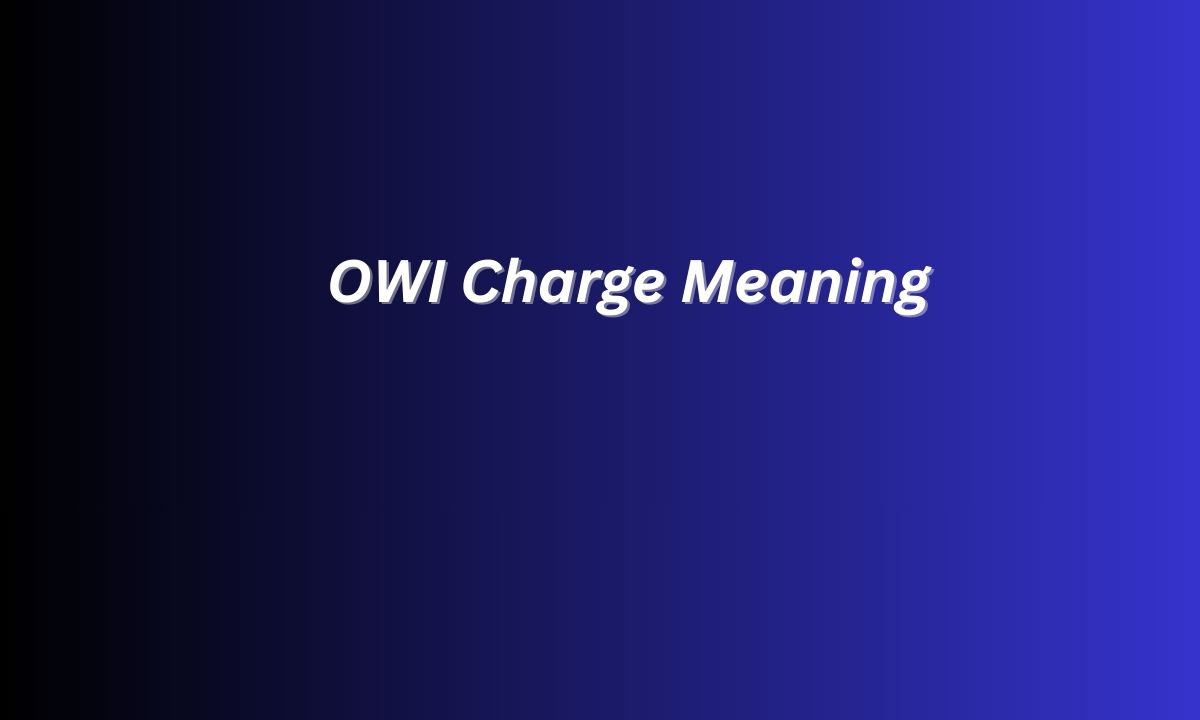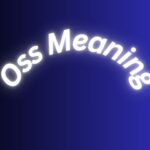Understanding the phrase “OWI charge meaning” is essential for both legal awareness and language clarity. Many people encounter this term in news articles, legal documents, or everyday conversations but may not fully grasp its significance. Its meaning depends on both context and tone.
The concept of an OWI charge primarily comes from the legal system. It represents an official accusation against someone for operating a vehicle under the influence of intoxicants. However, in English usage, its interpretation also extends to how the phrase functions in text, speech, and professional writing.
This article will explore the full depth of “owi charge meaning.” We will examine its legal foundation, usage in written and spoken communication, alternatives for clarity, and examples that help readers apply it appropriately in various situations.
What Does OWI Stand For?
OWI is an abbreviation for Operating While Intoxicated. It refers to the criminal charge brought against an individual who operates or drives a motor vehicle while impaired by alcohol, drugs, or controlled substances. Unlike some other terms, such as DUI (Driving Under the Influence) or DWI (Driving While Intoxicated), OWI emphasizes the act of operating rather than just driving.
The subtle distinction matters because a person may not need to be driving at full speed to face an OWI charge. Simply sitting in the driver’s seat with the car running while intoxicated can, in certain jurisdictions, result in this charge. This demonstrates how powerful language becomes in shaping legal meaning.
When people search for “owi charge meaning,” they often want clarity about both its legal implications and its usage in text. Understanding the background helps explain why this phrase carries such weight in law and communication.
OWI Charge Meaning in Text
When the phrase “owi charge meaning” appears in text, its purpose is usually explanatory. Writers may include it in articles, legal glossaries, or informational blogs to clarify the exact nature of the term. In written English, context determines how deeply one should explain the term.
For example, in a formal legal article, the phrase would be expanded upon with statutory references and jurisdictional details. In a casual blog, however, the explanation might be simplified to: “An OWI charge is what someone receives if caught operating a vehicle while drunk or under the influence.”
This balance between technical and conversational explanation illustrates how phrasing adapts to audience needs. By recognizing the importance of tone and context, writers can present “owi charge meaning” in a way that is accessible, respectful, and informative.
Legal Foundations of an OWI Charge
An OWI charge typically arises under state laws in the United States. States such as Wisconsin, Iowa, and Indiana use OWI as their preferred legal term. Other states may use DUI or DWI, but the fundamental offense remains the same: operating a vehicle under the influence.
Key elements of an OWI charge include:
- Operation of a Vehicle: This does not always require driving on a public road; being in control of the vehicle while intoxicated can be sufficient.
- Intoxication Level: Measured through blood alcohol concentration (BAC), usually at or above 0.08%. Some states enforce stricter limits for commercial drivers or individuals under 21.
- Evidence of Impairment: This may include field sobriety tests, chemical testing, officer observation, or witness testimony.
By understanding these foundations, readers can interpret “owi charge meaning” with greater accuracy and apply it correctly in both legal and everyday discussions.
Why “OWI” Instead of “DUI” or “DWI”?
The choice of OWI emphasizes operation rather than only driving. Legislators often adopt the term to broaden accountability. A person does not need to be on a highway or moving at full speed to be charged. Merely operating or attempting to operate a vehicle is enough.
This distinction reduces loopholes in defense arguments. For example, if someone is intoxicated but claims they were only “starting the car” or “waiting to drive,” OWI laws still apply. Thus, the terminology matters not only legally but also linguistically, because words guide interpretation.
Understanding why OWI exists helps people grasp why the phrase “owi charge meaning” carries broader significance than similar acronyms.
OWI Charge Meaning in Everyday Communication
Beyond its legal roots, the phrase “owi charge meaning” also appears in ordinary text or conversation. It can be part of workplace discussions, educational materials, or casual exchanges where clarity about driving offenses is required.
For instance, a journalist might write:
“Police arrested the suspect on an OWI charge, meaning the individual was accused of operating a vehicle while intoxicated.”
Here, the phrase functions to simplify legal terminology for general readers. The explanatory addition ensures accessibility without overwhelming the audience with technical details.
In communication, the goal is not only to define but also to ensure readers or listeners understand. This makes the phrase versatile in professional, academic, and casual use.
The Nuances of Tone in Explaining OWI
Tone shapes how “owi charge meaning” is delivered to an audience. A lawyer addressing clients may use professional, precise wording. A teacher explaining to students may opt for simplified examples. A journalist may strike a balance, ensuring accuracy without heavy legal jargon.
Examples of tonal variation:
- Formal/Professional: “An OWI charge denotes the statutory violation committed when an individual operates a vehicle while under the influence of intoxicants.”
- Polite/Neutral: “An OWI charge means being legally accused of driving while impaired by alcohol or drugs.”
- Casual/Informal: “An OWI charge basically means getting caught driving drunk or high.”
These examples illustrate how flexibility in expression allows the phrase to adapt across settings.
Polite, Professional, and Casual Alternatives
While the main focus here is “owi charge meaning,” English allows many ways to express the same idea. Depending on the situation, a writer or speaker might prefer different phrasing. Below are 15 carefully chosen alternatives across polite, professional, and casual tones.
Polite Alternatives
- Accused of operating a vehicle while impaired
- Charged with unsafe vehicle operation under influence
- Facing allegations of intoxicated driving
- Involvement in a vehicle-related intoxication charge
- Officially cited for impaired operation
Professional Alternatives
- Charged under OWI statutes for impaired operation
- Legal accusation of operating while intoxicated
- Offense related to intoxicated vehicle operation
- Citation for violation of impaired driving laws
- Documented charge of intoxicated operation
Casual Alternatives
- Busted for drunk driving
- Got charged for driving under the influence
- Pulled over and cited for being over the limit
- Facing a drinking-and-driving charge
- Booked for operating a car while drunk
These alternatives highlight how choice of words can make the explanation sound professional, respectful, or conversational depending on context.
Choosing the Best Alternative
When selecting an alternative to “owi charge meaning,” consider the audience and purpose. For legal documents, precision is critical, so formal language works best. In casual conversation, simple wording may be more effective.
- Legal audiences prefer “accused of operating while intoxicated” or “charged under OWI statutes.”
- Educational or media contexts benefit from clear, polite explanations such as “facing allegations of intoxicated driving.”
- Everyday discussions often use casual terms like “got busted for drunk driving,” which are understood quickly.
This adaptability underscores the importance of language awareness in communication.
Broader Implications of OWI Language
The way people use “owi charge meaning” also shapes public understanding of law. Polite and professional explanations reduce stigma while maintaining clarity. Casual expressions may resonate more strongly but risk trivializing the seriousness of the offense.
Therefore, careful choice of phrasing ensures respect for both the legal system and those affected. In communication, language does not merely describe—it influences perception.
Historical Development of OWI Terminology
The use of “Operating While Intoxicated” gained traction in U.S. states seeking broader legal coverage. Earlier laws focused strictly on “driving,” which sometimes created loopholes. Legislators adopted OWI to ensure intoxicated individuals could not avoid charges by claiming they were not technically “driving.”
Language evolves with law. Today, while DUI and DWI remain common, OWI highlights the broader concept of vehicle operation. This demonstrates how vocabulary grows to meet societal and legal needs.
Practical Examples in Sentences
- The driver faced an OWI charge, meaning he was accused of operating a vehicle while impaired.
- In Wisconsin, an OWI charge means stricter penalties compared to some neighboring states.
- The article explained the owi charge meaning so readers could understand the law better.
- An OWI charge means more than just drunk driving—it can include drug impairment.
- Students asked their teacher about the owi charge meaning during a class on legal vocabulary.
These examples demonstrate how the phrase functions across legal, educational, and conversational contexts.
Summary and Key Insights
- OWI stands for Operating While Intoxicated.
- An OWI charge means a legal accusation of operating a vehicle while impaired.
- It is broader than DUI or DWI, covering more than just active driving.
- The phrase adapts across formal, polite, and casual communication.
- Language choice affects perception, professionalism, and audience understanding.
Conclusion
Understanding “owi charge meaning” requires attention to both legal context and linguistic nuance. It represents more than a legal offense; it is also a phrase shaped by tone, audience, and communication goals. By exploring its foundations, alternatives, and examples, readers can better grasp how to use and interpret it in different settings.
Language provides not only definitions but also perspective. Whether explaining in a courtroom, teaching in a classroom, or conversing casually, choosing the right phrasing ensures clarity, professionalism, and respect for context.

Elizabeth crafts heartfelt messages for every occasion—anniversary wishes, love notes, prayers, thank-yous, and inspirational greetings—bringing warmth, joy, and connection to your special moments.










